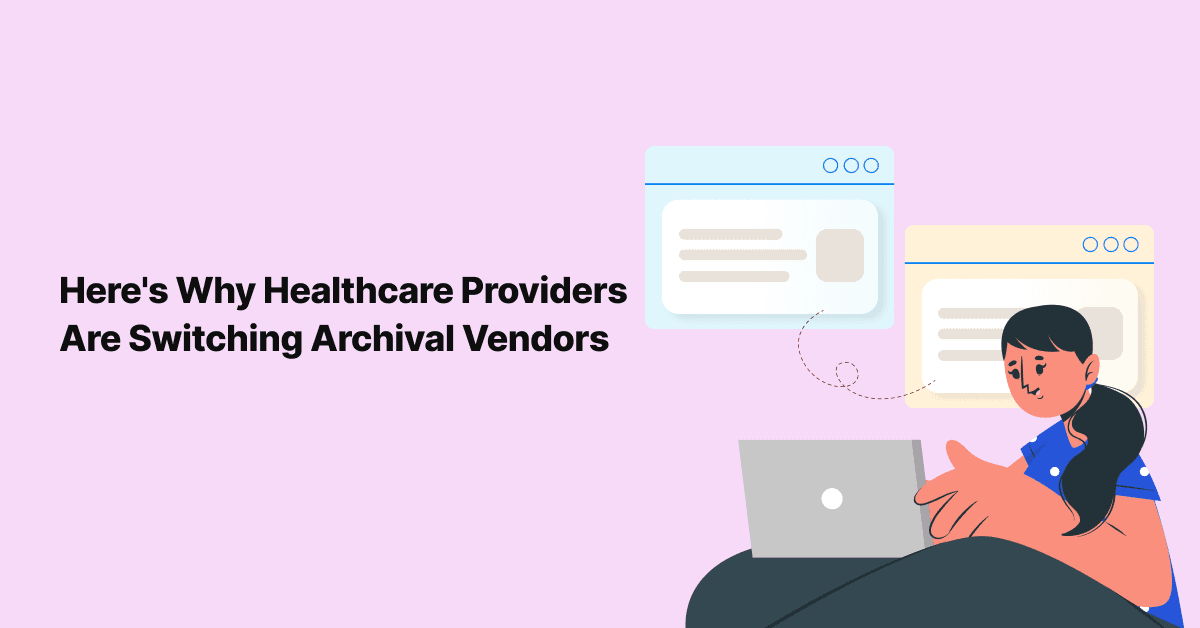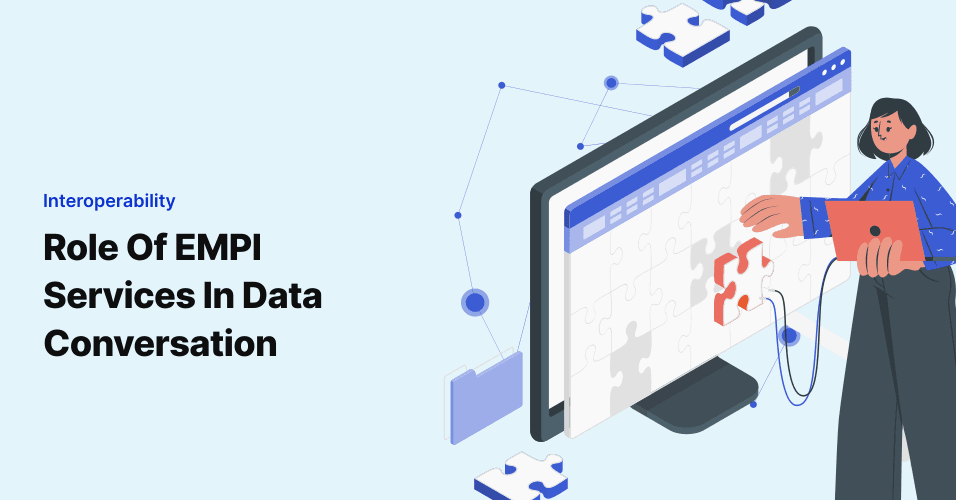
3 Ways to Improve Collaboration Between a Data Archival Vendor and Your Health System
The relationship that your health system shares with the archive vendors is as crucial a process as health …

Has the idea of switching archival vendors ever crossed your mind as a healthcare provider? For most medical facilities, digital records can easily outpace time and resources when it comes to staying compliant with government regulations.
However, there is some good news if you’re considering making the switch – more and more medical organizations are now tasked with handling new technology advancements in an efficient manner within their archive departments, which calls for greater flexibility around archiving solutions. Whether you’re feeling overwhelmed by expanding data requirements or coding changes keep spiking up your costs year after year, this article provides an in-depth look into why modern healthcare providers may want to start switching their vendor services.
What this blog covers:
The rising need for healthcare providers to archive records is driven by several factors, including legal requirements, patient care continuity, data analytics, and advancements in technology.
Let’s explore these factors in more detail:
When healthcare providers decide to switch archival vendors, it’s crucial to thoroughly assess potential platforms.
Some key features to look for include:
Data Backup and Disaster Recovery: A reliable archival platform should havUser-friendly Interface: Ensure that the platform has an intuitive and easy-to-navigate interface, allowing healthcare professionals to quickly access and manage patient data.
In today’s digital world, the need to ensure health data security is at an all-time high. With legislation such as HIPAA in place to protect sensitive information from malicious actors or unintentional actions, understanding how vendors process and secure personal health data has become a priority for both consumers and organizations alike.
There are several factors and considerations that drive health data security as one of the top priority for health data archival vendors. Some of them are:
Regulatory Compliance: The healthcare industry is subject to strict data security and privacy regulations. Vendors must ensure that their solutions comply with regulatory requirements like HIPAA to protect patient data from unauthorized access and breaches.
Increased Cybersecurity Threats: Healthcare organizations are prime targets for ransomware attacks, which can result in data breaches and costly data recovery efforts. Archival vendors must implement robust security measures to mitigate these threats.
Patient Privacy Concerns: Patients expect their health data to be treated with the utmost care and confidentiality. Any breach or mishandling of patient information can erode trust in healthcare providers and vendors.
Data Breach Costs: Data breaches can be financially devastating for both healthcare organizations and vendors. The cost of breach remediation, legal fees, and potential fines can be significant.
Data Encryption: Vendors are increasingly implementing end-to-end encryption to protect data both in transit and at rest. This ensures that even if unauthorized access occurs, the data remains unreadable.
Access Controls: Vendors are implementing strict access controls to ensure that only authorized personnel can access patient records. Role-based access ensures that users can only view the data necessary for their job functions.
Data security has become a paramount concern for health data archival vendors due to regulatory pressures, increasing cyber threats, and the critical importance of patient privacy. It is important for vendors to invest in robust security measures, staff training, and compliance efforts to ensure the safety and integrity of archived health data. The process of data security that a vendor follows forms the foundation for many healthcare providers to decide which health data archive vendor to go ahead with.
In the world of healthcare, the importance of Big Data Analytics cannot be overstated. With the ever-expanding amount of information generated from medical records, it’s crucial to have an effective and efficient way to store and manage patient data. Big Data Analytics offers a solution by allowing for the collection, analysis, and interpretation of vast amounts of healthcare data in real-time, allowing healthcare providers to make informed decisions quickly.
By leveraging this technology, healthcare professionals can unlock insights that were once impossible to gather, leading to better patient outcomes and ultimately, a healthier population. The benefits are clear, and it’s no surprise that Big Data Analytics is becoming increasingly vital to the future of healthcare record storage.
In the healthcare industry, it pays to always be one step ahead of the competition. For many years now, there have been discussions around digital health and moving towards more secure cloud storage. But up until recently, the shift has been slow and steady – with some organizations seeing improved efficiency while others lack motivation.
However, as technology continues to evolve and regulations become stricter for patient data security, the benefits of utilizing cloud-based medical record storage solutions are beginning to outweigh any drawbacks or uncertainties that may have once posed a challenge.
Here are some of the key advantages of moving medical record storage to the cloud:
1. Accessibility and Availability:
2. Security and Compliance:
3. Cost Efficiency:
4. Data Backup and Recovery:
5. Collaboration and Interoperability:
6. Data Analytics:
7. Reduced Physical Storage Space:
8. Patient Engagement:
While moving medical record storage to the cloud offers numerous benefits, it’s crucial for healthcare organizations to carefully select a reputable cloud provider, implement robust security measures, and ensure staff training to maximize the advantages while maintaining data privacy and security. Additionally, compliance with healthcare regulations is paramount to protect patient information adequately.
When it comes to managing and preserving your irreplaceable records, selecting an archival vendor is one of the most important decisions you will make. As daunting as it may seem, understanding the process involved in finding a reliable and trustworthy partner can help you find peace of mind when making this essential decision. From deciding how much storage space you need to researching vendor options that meet both your current and potential future requirements, there are many factors to consider when choosing a new archival company for all your digital records.
Here’s a step-by-step guide to demystify the process:
Assess Your Needs: Begin by understanding your organization’s specific requirements. Consider factors such as the volume of data, data types (electronic health records, images, etc.), compliance requirements (eg: HIPAA), and retrieval speed.
Define Objectives: Clearly outline your objectives for data archival. Are you looking to reduce costs, improve data accessibility, or ensure long-term data retention? Establishing goals will help guide your selection process.
Compliance Considerations: Ensure the vendor adheres to all relevant healthcare data regulations, including data security, privacy, and retention policies. Request their certifications and compliance documentation.
Evaluate Data Security: Data security is paramount in healthcare. Assess the vendor’s encryption methods, access controls, disaster recovery plans, and data breach response procedures. Consider on-premises vs. cloud-based solutions and their respective security measures.
Vendor Reputation and Experience: Research the vendor’s reputation within the healthcare industry, including checking KLAS reports and reviews, customer feedback, case studies, and references. Consider how long they’ve been in the business and if they have experience working with organizations similar to yours.
Scalability: Ensure the archival solution can scale with your organization’s growing data needs. Ask about their capacity and scalability options.
Data Retrieval and Accessibility: Assess how easily you can retrieve archived data when needed. Consider factors like indexing, search capabilities, and retrieval times. Can users access archived data seamlessly?
Data Migration Process: Discuss the process of migrating existing data to the new archival system. Ensure it’s seamless and does not disrupt your daily operations.
Cost Considerations: Request a detailed pricing structure that includes not only upfront costs but also ongoing fees. Understand any additional charges for data retrieval, upgrades, or support.
Service Level Agreements (SLAs): Define SLAs for data retrieval, uptime, and support. Ensure these SLAs align with your organization’s needs and expectations.
Interoperability and Integration: Determine how well the archival solution integrates with your existing health IT infrastructure. Compatibility with electronic health record (EHR) systems and other health data management tools is crucial.
Vendor Support and Training: Evaluate the level of support and training the vendor offers. Ensure they provide adequate training for your staff to use the archival system effectively.
Data Longevity and Migration Strategy: Discuss the vendor’s strategy for ensuring data longevity over time. What happens if you need to migrate to a new vendor in the future? Ensure they provide a clear plan for data migration.
Pilot Test: Before making a final decision, conduct a pilot test with the vendor’s solution to ensure it meets your requirements and expectations.
Contract Negotiation: Once you’ve selected a vendor, negotiate a contract that outlines all terms and conditions, including pricing, SLAs, data security, and exit strategies.
Implementation and Monitoring: Work closely with the vendor during implementation and continuously monitor the system’s performance and adherence to SLAs.
Data Governance: Develop a robust data governance strategy to ensure that data archived with the vendor complies with your organization’s policies and regulatory requirements.
Remember that selecting a health data archival vendor is a long-term commitment, and thorough due diligence is essential to ensure the security, accessibility, and compliance of your archived healthcare data.
Healthcare providers are always looking for innovative and cutting edge technologies to help them increase efficiency and effectiveness while reducing risk, cost, and downtime. As such, the shift to new archival vendors is both understandable and inevitable. With quality service, flexible customization capabilities, automated technology platforms, and secure storage protocols in mind, switching archival vendors can provide tremendous opportunities for healthcare providers to enhance their practice operations. It is a smart business decision that pays off for both the provider organization and its patient base. By making this change now, you can streamline your workflow processes without compromising on quality or convenience while ensuring that important data remains safe and secure.
Join over 3,200 subscribers and keep up-to-date with the latest innovations & best practices in Healthcare IT.

The relationship that your health system shares with the archive vendors is as crucial a process as health …

It is certainly not just in your health system but in almost all the renowned health systems that the emphasis …

When it comes to data conversion for health information (PHI), there are many aspects to consider to ensure …